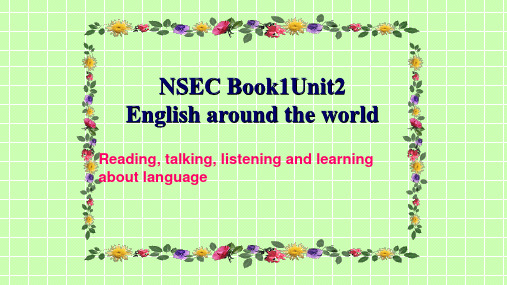人教BOOK1 Unit2 复习讲义
- 格式:docx
- 大小:16.42 KB
- 文档页数:2


Section ⅥThe Rest Parts of the Unit(P30~34)Ⅰ.单词语境记忆——根据英汉提示写出单词的适当形式1.Over the years,my grandmother is losing her sight(视力).2.Pygmalion made a stone statue(雕塑) of a beautiful woman.3.As the economy(经济) heated up,and so did car sales.4.At the meeting,you raised a reasonable request(要求).5.In this age of credit(信用) cards,it is still important to have at least a little of the local currency (货币) with you when you arrive in a country.6.Jerry did not regret giving the comment (评论) but felt that he could have expressed it differently.7.She placed a punch of flowers at the tomb(坟墓).8.Farmers still sometimes unearth(挖掘) human bones here.9.There’s a fine view (景象)of the lake from our hotel window.10.My boss arranged for me to discuss business details (细节)with someone from another company.Ⅱ.短语语境填空——根据汉语提示写出适当的短语1.Sir,you have been checked in(登记).Have you got too much luggage to check?2.He checked out(结账离开) and went to the airport by taxi.3.The exam results will be put up (张贴)on Friday afternoon.4.I do look forward to (期盼)receiving your reply letter as soon as possible.5.Lu Xun is known as(被称为) “the Gorky in China.”记单词Ⅰ.语境串记多义词She deserves credit for trying her best to pay off her student’s credit by her credit card.她尽了最大努力用她的信用卡为学生还清贷款,这是值得表扬的。



课题Book 1 Unit 2 课型复习课主备人年级学科课时共备人教学时间一、教学目标1.To master the important words, phrases, and sentence patterns.2.To apply what Ss learn to practice.二、复习范围Book 1 Unit 2三、重点和过程1.默写单词2.精讲3.讲练4.总结1apply vt.涂;敷;应用;运用vi.申请;请求;使用;专心致志单句填空①The new technology,if(apply)to rice growing,will help increase the grain output.②His (apply)for membership of the organization was rejected.③If the(apply)is not a true candidate for the job,do not interview him.④The book doesn t apply beginners.⑤More than30people applied the position.(1)apply to sb for sth向某人申请某物apply to适用于apply sth to sth把某物应用或涂抹于……apply oneself to=be applied to致力于/集中精力于……(2)application n.申请书;用途(3)applicant n.申请人拓展能力句式升级If you apply yourself to the job in hand,you ll soon finish it.⑥,you ll soon finish it.(现在分词短语作状语)⑦,you ll soon finish it.(过去分词短语作状语)2amazing adj.令人吃惊的单句填空①To my(amaze),he comes from America but cannot speak English.②Visitors were amazed the achievements in the car manufacture of the city during the past decade.③In the Olympic Games,Usain Bolt ran with(amaze)speed and won the first place.(1)amaze vt.使惊讶(2)amazed adj.吃惊的be amazed at/by对……感到吃惊(3)amazement n.惊奇to one s amazement令某人吃惊的是in amazement惊愕地一句多译让他感到吃惊的是,他惊人的成就没有使我们大为惊讶。

人教版Book1 Unit2 Travelling Abroad单元词汇与话题写作(适用于2024年9月秋季开学)Unit2 Travelling Abroad加黑词汇为本单元词汇完成句子1. 我写这封信是想申请成为在贵画廊举办的中国画展的志愿者。
I am writing to f or the Chinese Painting Exhibition which will beheld in your art gallery.2. 如果你愿意努力工作,我认为你很有可能获得这份工作。
受到他的话的鼓舞,我同意试一试。
If you're willing to I think you have a good shot at this.Encouraged by his words,I agreed to give it a try.3. 令人惊讶的是,他们也激励我更加欣赏自己的文化。
they also inspire me to appreciate my own culture more. 4. 不管怎样,我对你取得的进步感到惊讶。
Anyway,I'm t he progress you've made.5. (应用文之活动介绍)我写信是想告诉你一个很棒的活动,我们包了饺子。
I'm writing to tell you ,during which we made dumplings.6. (应用文之通知)如果你有兴趣,请在下周四下午五点前到办公室报名,以便我们作必要的安排。
If you are interested,please sign up at the office before 5:00 pm next Thursday so that we will7.(应用文之邀请信)你的建议对我们很有价值。
请提前通知我们你要来,以便及早安排。
Your advice will be of great value to us.Please inform us of your arrival in advance so that c an be made.8.父母为孩子安排好一切,不遗余力地为他们的成功铺平道路。

Unit2 Englishbe different from sth/sb in sth 在某方面与…不同play a role/ part (in) 在…中担任角色;在…中起作用;扮演一个角色;参与play an important role/ part 在…中起重要作用because of 因为;由于such as 例如believe it or not 信不信由你come up (vi) 走进;上来;发生;被讨论come up with 提出come up to a place 参观某地in the end/ at last/ finally 最后at the end of 在…的末端be at an end 结束了ever before 从前even if/ though 即使make sense 有意义instead of 代替be based on/upon 在...基础上on the basis of 根据,基于…be/get close to 距离…近make (good/ full) use of (好好/充分)利用change…into 把…变成in the early days 在早期from one place to another 从一处到另一处take…with…随身携带the same…as 与…相同的at present 目前as a rule 通常;照例be present at 在席;出席be absent from 缺席present sth to sb / present sb with sth 把…赠送(呈现)给某人carry out a rule 执行规则be a native of 是…人be native to 是…的土产动物/植物at sb’s request 应某人的要求have a(good)command of掌握make a request 请求command/request sb to do 命令/要求某人做某事command/request that …(should)+v原形in one direction 朝一个方向under the direction of 在…的指导下a wide vocabulary 庞大的词汇量an international language 一门国际语言an international organization 一个国际组织as we (all) know 正如我们所知the former/ the latter 前者/后者facial expression 面部表情Journey/ trip/ tour/ voyageSpecially/ especiallySuch as /like/ for example/ namely1.There is no such thing as Standard English.没有像标准英语那样的东西2. All languages change when cultures communicate with one another (each other).(当不同文化互相沟通时,所有的语言都会发生变化。




EIMBook1Unit2Helpingotherpeople单元知识要点Unit 2 Helping other peoplePart 1 (p18-19)New Wordvolunteer [?v?l?n?t??(r)] n.&v. 志愿者,志愿carry [?k?ri] v. 搬运,运送Village [?v?l?d?] n. 村庄southern [?s?e?n] adj. 南边的,南部的Train [tre?n] v. 训练Africa ['?fr?k?] n. ⾮洲Upstairs [??p?ste?z] adv. 楼上pay [pe?] v. ⽀付Need [ni?d] v. 需要voluntary [?v?l?ntri] adj. 志愿的To be understood:conservation [?k?ns??ve??n] n. 保护Nambia n. 纳⽶⽐亚Okavango n. [??kv?ng?u] 奥卡万⼽Delta [?delt?] n. 三⾓洲Botswana n. [b?t?swɑ?n?] 博茨⽡纳Word Form1.Africa ---African [??fr?k?n] adj. ⾮洲的2.train v. ---training [?tre?n??] n. 训练3.South n. 南部(⽅) ---southern adj. 南边的,南⽅的4.north n. 北部(⽅) ---northern adj. 北⽅的5.East n. 东部,东⽅---eastern adj. 东边的,东⽅的6.West n. 西部,西⽅---western adj. 西⽅的7.volunteer [?v?l?n?t??(r)] n.&v. 志愿者,志愿---voluntary [?v?l?ntri] adj. 志愿的---voluntarily adv. ⾃愿地Phrases and Sentences1.take/have ...off 休假She took two days off work.2.Volunteer to do sth. 志愿做某事Volunteer work 志愿者⼯作Aunt Mary volunteered to clean up the kitchen.3.in southern Africa =in the south of Africa =in south Africa =in the southern part of Africa 在⾮洲南部4.travel in and around sp. 在某地周围旅游5.sb. need to do sth. 需要做某事(negative)don’t need to do sth.=don’t have to do sth. 没有必要做某事He needs to finish the work before 8 o’clock.sb. need do sth. 某⼈需要做某事He need finish the work before 8 o’clock.6.sb. pay (some money) for sth.I will pay for the tickets.sb. spend some money/time on sth.Andy spends a lot of money on shoes.sb. spend some money/time (in) doing sth.sth. cost some moneyThat book cost me ten dollars.7.sick people 病⼈8.He works for the bank without being paid.9.sb. train to do/to be sth. 某⼈受训做某事He is training to be a doctor.train sb. to do sth. 训练某⼈做某事They train dogs to pick out the drugs.do some training 训练10.help sb. with sth. 帮助某⼈某事I should thank him for helping me with my English homework.help sb. to do sth. 帮助某⼈做某事11.take for a walk 散步12.at the moment =at present ⽬前Unit 2 Part 2 (p20-21)New Worduniform [?ju?n?f??m] n.制服,军服;adj. ⼀样的geography [d?i??ɡr?fi] n.地理(学),地形surf[s??f] v. 冲浪;互联⽹上冲浪net[net] n. ⽹,⽹络(=Internet)tonight[t??na?t] n. 今晚;adv. 在今晚machine [mi?n] n. 机器washing machine n. 洗⾐机prefer [pr??f??(r)] v. 更喜欢pleasure [?ple??(r)] n. 愉快,娱乐,令⼈⾼兴的事iron [?a??n] v. 熨;n. 铁器;adj. 铁制的tidy[?ta?di] v. 整理,收;adj. 整洁的wardrobe [?w??dr??b] n. ⾐柜interview[??nt?vju?] n.&v. 采访,⾯试radio [?re?di??] n. 收⾳机,⽆线电⼴播台line [la?n] n. 线条,排,界限phone line 电话线pillow [?p?l??] n. 枕头cloth[kl?θ] n. 布,织物,⼀块(pl. cloths) clothes [kl??ez] n. ⾐服mop[m?p] n. 拖把drawer [dr??(r)] n. 抽屉bin [b?n] n. 垃圾桶bucket [?b?k?t] n. ⽔桶poster [?p??st?(r)] n. 海报To be understood:present simple ⼀般现在时present continuous 现在进⾏时tense [tens] n. (动词的)时,时态volcano [v?l?ke?n??] n. ⽕⼭duvet [?du?ve?] n. ⽻绒被vacuum [?v?kju?m] n. 清洁,真空a vacuum cleaner n. 吸尘器rack [r?k] n. ⽀架,架⼦Namibia [nɑ??m?b??] 纳⽶⽐亚Canterbury [?k?nt?b?ri] n. 坎特伯雷(a city in England)Word Form1.cook v. 烹饪,煮;n. 厨师---cooker n. 厨具2.interview v./n. 采访,⾯试---interviewer n. 采访者,⾯试官---interviewee n. 被采访者,参加⾯试者Phrases and Sentences1.look outside 朝外看look inside 朝⾥看2.at the moment =now 此时此刻3.surf the net/Internet 上⽹4.have an interview with sb. 有⼀个关于某⼈的采访The interviewer is having a radio interview with Mike at the moment.5.prefer dong sth.=prefer to do sth. 更喜欢做某事preder A to B (to:prep.) =like A better than BSarah prefers documentaries to soap operas. =Sarah likes documentaries better than soap operas.6.by hand ⽤⼿的,亲⾃的,⼿⼯They don’t have a washing machine, so they have to do the washing by hand.7.do the cooking =cook fooddo the ironing =iron clothesdo the shopping =shop for the goodsdo the washing-up =wash up =wash dishesdo the washing =washing clothestidy up =tidy a room8.It’s my pleasure. 我的荣幸---Thanks very much for helping me.---It’s my pleasure.Unit 2 Part 3 P22-23New Wordmove [mu?v] v. 移动event [??vent] n. 事件,活动though [e??] conj. 虽然,尽管;adv. 不过,可是well [wel] adj. 健康的,状态好的mad [m?d] adj. 疯的,蠢的payment [?pe?m?nt] n. 付款,⽀付,收款prepare [pr??pe?(r)] v. 准备,为...做准备designer [d?? za?n?(r)] n. 设计师To be understood:jewellery/jewelry [?d?u??lri] n. 珠宝饰物wrist [r?st] n. ⼿腕,腕关节community [k??mju?n?ti] n. 社区,社会,团体,社团service [?s??v?s] n. 服务bracelet [?bre?sl?t] n. ⼿链,⼿镯,臂镯pin [p?n] n. ⼤头针,饰针;v. 固定,别上Word Form1.mad ---madder ---maddest2.well ---better ---best3.pay v. ---paid ---paid ---payment n.4.design n./v. 设计---designer n. 设计师5.prepare [pr??pe?(r)] v. 准备,为...做准备---preparation [?prep??re??n] cn. 准备Phrases and Sentences1.fashion designer 时尚设计师2.prepare sth. Blaire spent all day prepareing the meal.prepare for sth. He prepared for the English Competition for a long time.prepare to do sth.Dod you prepare to write an e-mail to tell your e-pal about your interests and hobbies? 3.let sb do sth. 让某⼈做某事let’s =let usdon’t let sb. do sth. 不让某⼈做某事give sb. a hand Come and give me a hand in the garden. 到花园来给我搭把⼿。





Ⅰ.读句品词——阅读下列句子,写出加黑单词的词性及汉语意思1.Judging from your accent,you must be from England.n.口音其他意义:腔调;重音2.After today’s heavy snow,many roads are still blocked,so we have to choose another way.v.阻塞;堵塞其他意义:n.街区;块;木块;石块3.As you know,bamboo always stands straight,so it represents “noble”and “strong-willed”.ad v.笔直地4.The study of science has enriched all our lives,which makes us live simply.v.使丰富;充实Ⅱ.语境填词背一背1.official adj.官方的;正式的;公务的n.官员2.voyage n.航行;航海3.native adj.本国的;本地的n.本国人;本地人4.actually ad v.事实上;实际上5.gradual adj.逐渐的;逐步的6.latter adj.较后的;(两者中)后者的;后半的n.后者7.command n.& v t.命令;指令;掌握8.request n.& v t.请求;要求练一练[从左栏中选择合适的单词并用其正确形式填空]1.I made friends with the natives,and their reaction amazed me.2.Of the two opinions,I disagree with the former,but prefer the latter.3.Last week some city officials suggested the city should be interested in turning the old theater into a museum and public meeting place.4.The voyage from England to India used to take six months,but now it takes less.5.If you have a good command of foreign languages,you’ll have no difficulty working in this company.Ⅲ.拓展提升背一背1.base v t.以……为根据n.基部;基础;基地→basic adj.基础的→basis n.基础;基部;基准2.spelling n.拼写;拼法→spell v.拼写3.identity n.本身;本体;身份→identify v.确认;识别4.fluent adj.流利的;流畅的→fluency n.流利;流畅→fluently ad v.流利地;流畅地5.frequent adj.频繁的;常见的→frequently ad v.常常;频繁地→frequency n.频率;次数6.expression n.词语;表示;表达;表情→express v t.表示;表达n.快车;速递7.recognize v t.辨认出;承认;公认→recognition n.识别;承认;赞誉练一练[用所给单词的正确形式填空]1.In order to speak English fluently(fluent),I practice oral English with my partner every day. 2.As soon as he heard the news,an expression(express) of surprise automatically appeared. 3.It is recognized that environmental pollution has become one of the most serious problems that people face and some cities have changed beyond all recognition.(recognize)4.Based on the analysis about it,we changed the basic use of it.(base)5.The police asked him to show his identity card to identify whether he was the attacker.(identity)Ⅳ.选词填空背一背1.more than超过;非常;不只是;不仅是2.because of由于;因为3.come up走近;上来;被提出4.base...on/upon以……为基础/根据5.at present目前;现在6.make use of利用;使用7.such as例如……;像这种的8.leave for动身去9.believe it or not信不信由你10.play a part (in)扮演一个角色;参与练一练[从左栏中选择合适的短语并用其正确形式填空]1.Believe it or not,the poor old man is a greatest scientist.2.They tried their best to make use of the chance that their school offered to study abroad. 3.At present,I do not have information about the meeting you asked about.4.The question which came up at the meeting was whether we had enough money. 5.He was sentenced to death because of what he had stolen from the bank.6.He was more than sad when he heard the news that his grandmother had passed away.Ⅴ.仿写运用背一背1.Native English speakers can understand each other even if they don’t speak the same kind of English.以英语作为母语的人,即使他们所讲的语言不尽相同,也可以相互理解。



Book 1Unit 2English around the world词汇积累分层单词▶写作词汇1.adj.本地的;本国的n.本地人;本国人2.vt.以……为根据n.基部;基地;基础3.n.词汇;词汇量4.n.拼写;拼法5.n. & vt.命令;指令;掌握6.n. & vt.请求;要求7.adv.直接;挺直adj.直的;笔直的;正直的8.adj.流利的;流畅的答案 1.native 2.base 3.vocabulary 4.spelling mand 6.request7.straight8.fluent▶阅读词汇1.elevator n.2.petrol n.3.official adj.4.voyage n.5.apartment n.tter adj.7.identity n.8.accent n.9.lightning n.10.block n.答案 1.电梯;升降机 2.汽油 3.官方的;正式的;公务的 4.航行;航海 5.公寓住宅;单元住宅 6.较后的;后半的;(两者中)后者的7.本身;本体;身份8.口音;腔调;重音9.闪电10.街区;块;木块;石块▶拓展词汇1.adv.实际上;事实上→adj.真实的;实际的2.adj.逐渐的;逐步的→adv.逐渐地;逐步地3.adj.流利的;流畅的→adv.流利地;流畅地→n.流利;流畅4.adj.频繁的;常见的→adv.常常;频繁地→n.频率5.n.使用;用法→vt.使用n.用途→adj.有用的→adj.无用的6.n.词语;表示;表达→vt.表达7.vt.辨认出;承认;公认→n.认出;认识答案 1.actually;actual 2.gradual;gradually 3.fluent;fluently;fluency4.frequent;frequently;frequencyage;use;useful;useless6.expression;express7.recognize;recognition高频短语1.由于;因为2.走近;上来;提出3.现在;目前4.利用;使用5.例如……;像这种的6.(在……中)扮演一个角色;参与(……)7.以……为基础8.……的数量9.超过;非常10.信不信由你答案 1.because of e up 3.at present 4.make use of 5.such as 6.play a part(in...)7.be based on...8.the number of9.more than10.believe it or not经典句型1.(为什么不)go by Underground?2.Native English speakers can understand each other(即使他们说的不是同一种英语).3.(它更多是以德语为基础)than the English we speak at present.4.Believe it or not, (没有什么标准英语).5.(这是因为)in the early days of radio, those who reported the news were expected to speak excellent English.答案 1.Why not 2.even if they don’t speak the same kind of English 3.It was based more on German 4.there is no such thing as standard English 5.This is becauseBook 1Unit 2English around the world 课文与语法填空阅读下面短文,在空白处填入1个适当的单词或括号内单词的正确形式。

Unit 2 ReadingText 1课前预习一、课文理解1、What’s the main idea of the passage?2、How many parts the passage can be divided into.A、2B、3C、4D、53、Which sentence in the passage can be replaced by the following one?In the 1600s ,be cause English people made voyages and conquered other parts of the world people in many other countries began to speak English.4、When did English begin to become .Indian official language?A、TodayB、from 1765 to 1947C、by the 19th centuryD、about the middle of 18th century5、Translate the sentence into Chinese.Native English speakers can understand each other Even if they don’t speak the same kind of English.二、基础知识短语英汉互译1、通向现代英语之路2、海上航行3、很多其他的国家4、than ever before5、come up to one’s apartment6、以…为基础7、at present8、rule9、enrich10、a wider vocabulary三、Translate the sentences and recite1、如今说英语的人比以往任何时候都多了,他们有的是作为第一语言来说。
BOOK1 Unit2 基础知识巩固练习
一、单词短语考查
1. Tom seems to be happy all day, but a__________ he is tired of his tired of his life.
2. Don’t believe what he said. His story is ________(以…为根据) on nothing.
3. Believe it or not, Lily came up to me yesterday,but I didn’t r_________ her at first sight.
4. Go s_________ on until you come to a bus stop.
5. The general __________ (命令) his soldiers to attack the enemy.
6. I made a __________ (要求) that we attach importance to our dialects.
7. A policeman _________ ________ (走近) to him and asked him to show his identity card.
8. _________ _________ (因为) being crazy about nature, the girl stayed awake on purpose .
9. I like many English programmes, s_______ a_____ Follow me, Follow me to science.
10. I’m afraid I can’t help you with your work. I’m too busy a_____ p__________.
11. He _______ _______ _______ _______ (充分利用) his time there by learning the foreign language.
12. Telephones are __________ ________ ________ _______ (起作用) our daily life.
二、课文填空
Voyages of people from England play 1___ important part in spreading the English language. At present, English is 2___ (frequent) spoken as an official or common language in many countries, such 3___ America, Singapore, Malaysia and some African countries. All based on British English, the English 4 (speak) in these countries can be well understood by native English speakers. But 5 (actual), these Englishes have been gradually 6_ (change) in accents, spellings, 7 (express) and the usage of vocabulary. Because of this fact, you can make use of the differences to tell 8___ country the foreigners of your block are from. For example, if a boss fluently 9 (command) his dr iver, “Come up straight to my apartment by elevator and take some gas for my trucks and cabs”, instead of requesting, “Please come to my flat by lift and take some petrol for my lorries and taixs”, you can recognize him American identity, while the latter _ 10__ (suggest) that he is British.
三、语法(直接引语和间接引语)
1.直接引语是陈述句时,间接引语为that引导的宾语从句(口语中that可以省略),主句的引述动词主要有say ,tell, repeat, explain, think等。
Eg:He said , "You are younger than I." → He said (that ) I was younger than him.
2.直接引语是疑问句时,间接引语为陈述语序:主句的谓语动词say 改为ask,或改为wonder, do not know, want to know, be not sure, be puzzled等。
1)一般疑问句或反意疑问句变为if (whether)引导的宾语从句。
She asked me , "You have seen the film, haven't you?"
→She asked me whether(或if )I had seen the film.
2)选择疑问句变为whether….or 宾语从句。
I asked him, "Will you stay at home or go to a film tonight?"
→I asked him whether he would stay at home or go to a film that night.
3)特殊疑问句变为由原来的疑问词引导的宾语从句。
He asked , "Where do you live?" →He asked me where I lived.
3.直接引语是祈使句时,间接引语为不定式,作ask , tell, beg, order, warn, advise等动词的宾语补足语(don't 变为not ).
The teacher said to the boy, "Open the window."
→The teacher told the boy to open the window.
4.直接引语是感叹句时,间接引语为what 或how引导,也可以用that 引导。
She said, "What a lovely day it is !"
→She said what a lovely day it was .或She said that it was a lovely day.
5.直接引语与间接引语常考点:
1)引导词的选用;
2)语序:陈述语序;
3)时态的变化;
4)指示代词、时间状语、地点状语和动词的变化。